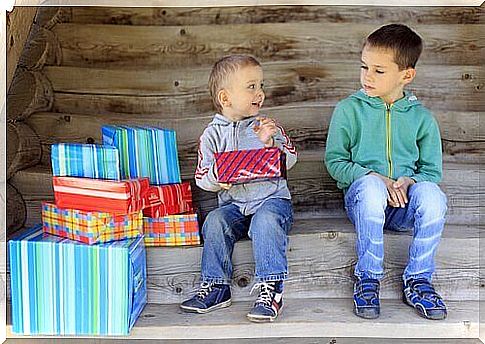Interesting Facts About Sibling Relationships

Our siblings are always there for us when we need them. In this article, we describe some facts about sibling relationships.
Undoubtedly , siblings play a significant role in our lives and our development. Throughout history, there have been many stories, legends and legends about sibling relationships. As an example, we have the love story of Isis and Osiri and the sibling relationship in Mozart’s Magic Flute.
Whether it is from first-hand experiences or by observing other families, we all see how important the sibling relationship really is. They can even affect the individual’s cognitive development.
Parents put a lot of effort into training and educating their children. Although it is good, many parents mistakenly believe that these are the only ways to learn. They often underestimate how much siblings can learn and influence each other, whether it is positive or negative.
In this article, we will talk about two specific hypotheses: (a) sibling compensation and (b) hostility due to favoritism. Both hypotheses are related to how parents treat their children.

First and foremost, it is important to clarify that sibling relationships cannot be studied or examined in isolation. What we mean is that it is important to keep other variables in mind, such as how parents treat their children. What happens if parents do not treat their children as they should. Can siblings compensate for this shortcoming through their relationship?
The hypothesis of sibling compensation establishes that siblings can develop close, warm relationships. As a result, they can help each other in situations where parental care is lacking. In other words, siblings can compensate for the lack of parental affection by taking care of each other. In this way, we are able to develop normally despite the parental lack.
Studies of this hypothesis show positive results. There seems to be an inverse relationship between the quality of parent-child interactions, and the quality of the sibling relationship. Bryant and Crockenberg conducted a study in which they found that the mother’s indifference to her children was directly related to a large amount of prosocial behaviors from the oldest sibling to the smallest.
These results make us think that where there is no parental support, the siblings will try to support and learn from each other. However, it is important to be careful when interpreting this information as other studies have shown other results. As we said earlier, it is not easy to study sibling relationships because no two cases are alike. Many different factors besides the parental aspect play a role.

Parental behavior can also lead to hostility between siblings. This is where this hypothesis comes into play. It refers to children’s perceptions of the way their parents treat them.
Hostility due to favoritism suggests that sibling relationships may become hostile if one of them perceives that their parents are treating them differently. In other words, if a child perceives that his or her parents favor another sibling (or other siblings for that matter), he or she will automatically feel jealous and jealous. As a result, the child will show hostile behavior towards his / her siblings.
Hetherington conducted an experiment that found that when parents are less affective towards their children, the likelihood of sibling relationships becoming more aggressive increases. The child rebels against his parents by seeking revenge on his siblings. However, there are many more factors that can influence sibling relationships.
All research on this topic shows how important sibling relationships are for personal development. In the end, siblings are the ones we can always turn to and learn from in life.









